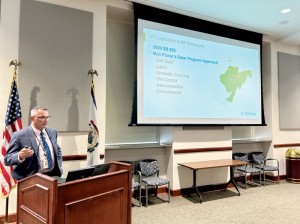From an Article by Steven Allen Adams, Parkersburg News and Sentinel, July 27, 2023
CHARLESTON — Two FirstEnergy subsidiaries in West Virginia hope to have small-scale solar power plants up and running between 2024 and 2026.
Members of the West Virginia Public Energy Authority received a briefing Wednesday morning from Douglas Hartman, director of energy services for Akron-based FirstEnergy, on new solar projects being built by MonPower and Potomac Edison. MonPower and Potomac Edison are constructing five solar sites on nearby coal ash disposal sites it owns in its service areas. Solar locations in phase one of the project include Wylie Ridge in Hancock County, Rivesville in Marion County, Fort Martin in Monongalia County, Davis in Tucker County and Marlowe in Berkeley County.
The effort is being made possible through Senate Bill 583 passed in 2020, which is designed to support economic development for solar projects targeting brownfields and other low-value sites. The bill allows each utility to develop 200 megawatts of solar generation, though the utilities are limited to only 50 megawatt increments to start. The bill also requires an 85% subscription rate and includes options for energy storage.
The sites at Fort Martin, Marlowe and Rivesville are building on reclaimed coal ash piles. The Davis site is being built on a reclaimed strip mine. The Wylie Ridge site is being built adjacent to a MonPower substation.
The Fort Martin site is expected to go online at the end of 2023 or the beginning of 2024, followed by Marlow, Wylie Ridge and Rivesville in 2025 and Davis in 2026. “The nice thing about them being smaller is we can interconnect directly into our distribution grid and distribution system, which obviously is a MonPower or Potomac Edison system,” Hartman said.
“Interconnection is a little different than having to go through the PJM-Q process, which may be a (2026-2027) agreement that we would be able to execute. That was very important for us and certainly a good outcome.” The Fort Martin site alone is more than 94 acres, which equates to about 5 megawatts per acre. The Fort Martin site will produce 19 megawatts when completed and produce 33 gigawatt hours of energy annually.
FirstEnergy also offers a solar renewable energy credit program for MonPower and Potomac Edison customers. Customers can enroll with FirstEnergy, which gives customers the ability to purchase renewable energy produced by the company.
The program costs 4 cents per kilowatt hour, with subscription levels in 50 kilowatt blocks, ranging from an additional $2 per month on residential bills to $40 per month for 1,000 kilowatt hours, the average amount of power used by customers. Hartman said the program has more than 720 residential customers to date.
According to the U.S. Energy Information Agency, renewables make up 21.5% of the nation’s electricity generation as of 2022 while coal makes up 19.5% now and is likely to keep decreasing. West Virginia is one of the few states that receives the vast majority of its power from coal-fired generation.
Nick Preservati, an energy attorney and the former vice chairman of the Public Energy Authority, was appointed by Gov. Jim Justice two weeks ago as director of the state Office of Energy. Preservati presented his goals for the office to authority members. “West Virginia is embracing alternative energy sources, such as wind and solar, the Legislature has lifted the ban on nuclear energy and the (Inflation Reduction Act) and the (Infrastructure Investment and Jobs Act) will provide significant opportunities that are consistent with West Virginia’s objectives,” Preservati said. “The critical part of that is supporting existing energy sources. That means supporting coal. That means supporting natural gas in the state. That is what I believe is going to help us.”
James Bailey, cabinet secretary for the Department of Commerce and chairman of the Public Energy Authority, made a motion to also appoint Preservati as director of the Public Energy Authority. While the authority doesn’t require a director, Bailey said State Code doesn’t prohibit the appointment of a director. “The Office of Energy is statutorily tasked with providing administrative support for the Public Energy Authority,” Bailey said. “We have not utilized that over the last year or so since we’ve been reactivated for different reasons. But with Nick’s enthusiasm and expertise in this office, I believe it’s time to start utilizing that and maximize the effectiveness of this authority.”
PHOTO ~ Douglas Hartman, director of energy services for FirstEnergy, briefs members of the state Public Energy Authority on upcoming solar energy projects.

